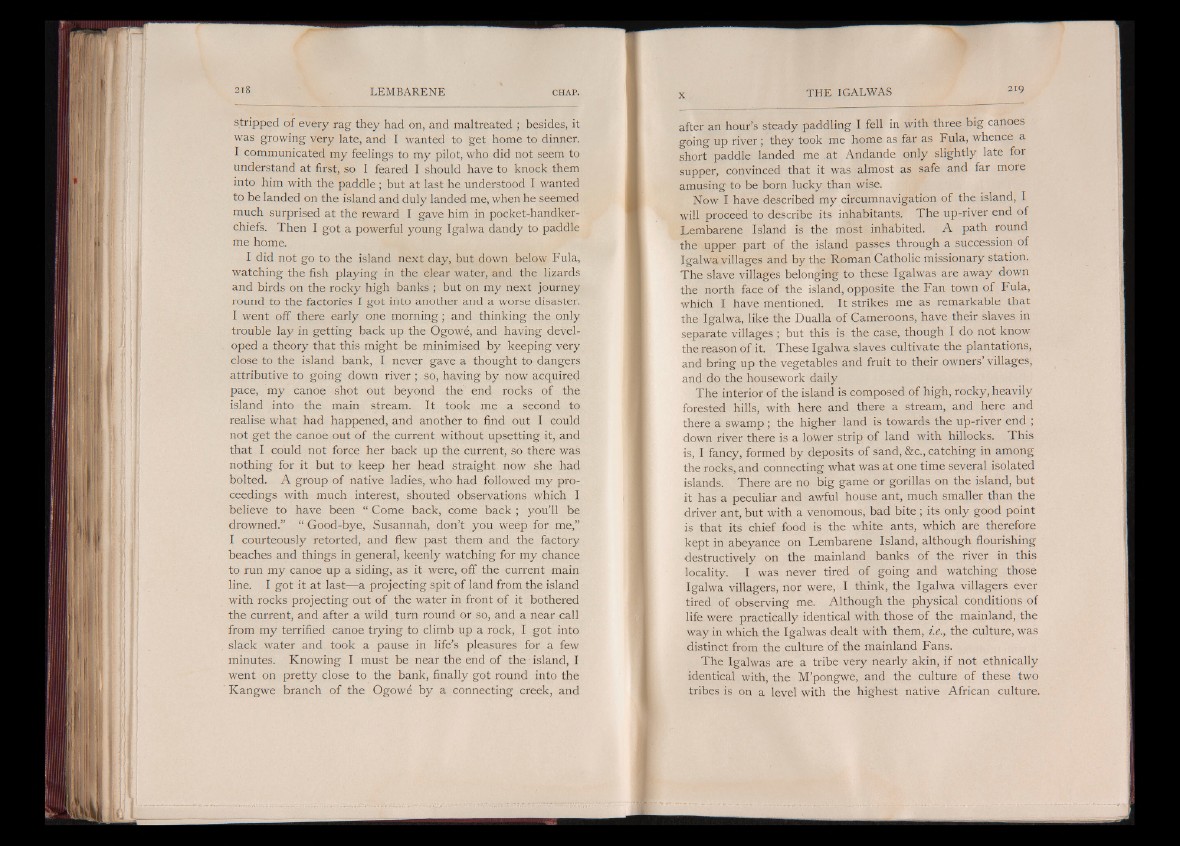
Gripped of every rag they had on, and maltreated ; besides, it
was growing very late, and I wanted to get home to dinner.
I communicated my feelings to my pilot, who did not seem to
understand at first, so I feared I should have to knock them
into him with the paddle; but at last he understood I wanted
to be landed on the island and duly landed me, when he seemed
much surprised at the reward I gave him in pocket-handkerchiefs.
Then I got a powerful young Igalwa dandy to paddle
me home.
I did not go to the island next day, but down below Fula,
watching the fish playing in the clear water, and the lizards
and birds on the rocky high banks ; but on my next journey
round to the factories I got into another and a worse disaster.
I went off there early one morning; and thinking the only
trouble lay in getting back up the Ogowe, and having developed
a theory that this might be minimised by keeping very
close to the island bank, I never gave a thought to dangers
attributive to going down river ; so, having by now acquired
pace, my canoe shot out beyond the end rocks of the
island into the main stream. It took me a second to
realise what had happened, and another to find out I could
not get the canoe out of the current without upsetting it, and
that I could not force her back up the current, so there was
nothing for it but to keep her head straight now she had
bolted. A group of native ladies, who had followed my proceedings
with much interest, shouted observations which I
believe to have been “ Come back, come back ; you’ll be
drowned.” “ Good-bye, Susannah, don’t you weep for me,”
I courteously retorted, and flew past them and the factory
beaches and things in.general, keenly watching for my chance
to run my canoe up a siding, as it were, off the current main
line. I got it at last— a projecting spit of land from the island
with rocks projecting out of the water in front of it bothered
the current, and after a wild turn round or so, and a near call
from my terrified canoe trying to climb up a rock, I got into
slack water and took a pause in life’s pleasures for a few
minutes. Knowing I must be near the end of the island, I
went on pretty close to the bank, finally got round into the
Kangwe branch of the Ogowe by a connecting creek, and
after an hour’s steady paddling I fell in with three big canoes
going up river ; they took me home as far as Fula, whence a
short paddle landed me .at Andande only slightly late for
supper, convinced that it was almost as safe and far more
amusing to be born lucky than wise.
Now I have described my circumnavigation of the island, I
will proceed to describe its inhabitants. The up-river end of
Lembarene Island is the most inhabited. A path round
the upper part of the island passes through a succession of
Igalwa villages and by the Roman Catholic missionary station.
The slave villages belonging to these Igalwas are away down
the north face of the island, opposite the Fan town of Fula,
which I have mentioned. It strikes me as remarkable that
the Igalwa, like the Dualla of Cameroons, have their slaves in
separate villages ; but this is the case, though I do not know
the reason of it. These Igalwa slaves cultivate the plantations,
and bring up the vegetables and fruit to their owners’ villages,
and do the housework daily
The interior of the island is composed of high, rocky, heavily
forested hills, with here and there a stream, and here and
there a swamp ; the higher land is towards the up-river end ;
down river there is a lower strip of land with hillocks. This
is, I fancy, formed by deposits of sand, &c., catching in among
the rocks, and connecting what was at one time several isolated
islands. There are no big game or gorillas on the island, but
it has a peculiar and awful house ant, much smaller than the
driver ant, but with a venomous, bad bite ; its only good point
is that its chief food is the white ants, which are therefore
kept in abeyance on Lembarene Island, although flourishing
destructively on the mainland banks of the river in this
locality. I was never tired of going and watching those
Igalwa villagers, nor were, I think, the Igalwa villagers ever
tired of observing me. Although the physical conditions of
life were practically identical with those of the mainland, the
way in which the Igalwas dealt with them, i.e., the culture, was
distinct from the culture of the mainland Fans.
The Igalwas are a tribe very nearly akin, if not ethnically
identical with, the M’pongwe, and the culture of these two
tribes is on a level with the highest native African culture.